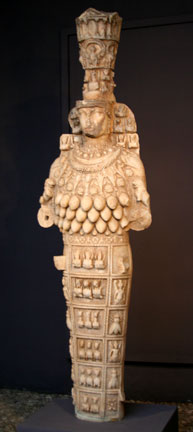« The Apostle Paul in Ephesus | Home | Paul and the Silversmiths »
Artemis and Her Temple
By Mark D. Roberts | Thursday, August 16, 2007
Part 7 of series: Ancient Ephesus and the New Testament
Permalink for this post / Permalink for this series
 In my last post I summarized the beginning of Paul’s ministry in Ephesus as it’s described in Acts 19. We saw that after first being stymied in his effort to reach out to Ephesian Jews through the synagogue, Paul switched to a lecture hall, where he experienced a more positive response to his preaching. In fact, the success of Paul’s ministry led to a major disturbance in the city. In order to grasp the nature of this uproar, we must understand one of the most important facts about ancient Ephesus: it was home to the Temple of Artemis.
In my last post I summarized the beginning of Paul’s ministry in Ephesus as it’s described in Acts 19. We saw that after first being stymied in his effort to reach out to Ephesian Jews through the synagogue, Paul switched to a lecture hall, where he experienced a more positive response to his preaching. In fact, the success of Paul’s ministry led to a major disturbance in the city. In order to grasp the nature of this uproar, we must understand one of the most important facts about ancient Ephesus: it was home to the Temple of Artemis.
 Ironically, this temple has been mentioned in recent news stories (click here for an example). Late last month a survey of 100 million voters resulted in a new list of the Seven Wonders of the World. In its current state, the Temple of Artemis would never make such a list. But in its heyday, which includes the first century A.D., this temple was considered one of the Seven Wonders of the World. It was one of the largest temples in the world, and drew visitors from far and wide.
Ironically, this temple has been mentioned in recent news stories (click here for an example). Late last month a survey of 100 million voters resulted in a new list of the Seven Wonders of the World. In its current state, the Temple of Artemis would never make such a list. But in its heyday, which includes the first century A.D., this temple was considered one of the Seven Wonders of the World. It was one of the largest temples in the world, and drew visitors from far and wide.
The goddess Artemis was a combination of the Greek goddess named Artemis, the virginal goddess of the hunt. In Asia Minor, the region of Ephesus, this Greek goddess was combined with elements associated with the Anatolian goddess Cybele, who was associated the earth and with fertility, and was sometimes known as the Great Mother. (Yes, the Ephesian Artemis somehow combined the virginal Artemis with Cybele, the fertile mother. The photo to the right shows a statue of Artemis that was found at Ephesus, and is now prominently displayed in the Ephesian museum. The “crown” on her head is a representation of the temple. The “eggs” surrounding her midsection are perhaps some fertility symbol, though scholars don’t agree on their denotation.)
 For Ephesus, having the temple of Artemis nearby (about a mile from the main city) was a great boon. One the one hand, the presence of such a temple demonstrated the importance of Ephesus and was thought to bring special blessing upon the city. On the other hand, worshipers came from all around to visit the temple, and in so doing spent lots of money on lodging, offerings, and so forth.
For Ephesus, having the temple of Artemis nearby (about a mile from the main city) was a great boon. One the one hand, the presence of such a temple demonstrated the importance of Ephesus and was thought to bring special blessing upon the city. On the other hand, worshipers came from all around to visit the temple, and in so doing spent lots of money on lodging, offerings, and so forth.
Today, little is left of the temple of Artemis. You must use your imagination to picture its former glory. There is, however, a model of the temple in the museum which can help to fill in the blanks.
Therefore, anything that threatened the prominence of Artemis and her temple would have been seen as a major threat to Ephesus itself. In my next post we’ll see how this played out in Acts 19.
Topics: Archeology and the Bible |
One Response to “Artemis and Her Temple”
Comments
Thanks for your willingness to make a comment. Note: I do not moderate comments before they are posted, though they are automatically screened for profanities, spam, etc., and sometimes the screening program holds comments for moderation even though they're not offensive. I encourage open dialogue and serious disagreement, and am always willing to learn from my mistakes. I will not delete comments unless they are extraordinarily rude or irrelevant to the topic at hand. You do need to login in order to make a comment, because this cuts down on spam. You are free to use a nickname if you wish. Finally, I will eventually read all comments, but I don't have the time to respond to them on a consistent basis because I've got a few other demands on my time, like my "day job," my family, sleep, etc.
You must be logged in to post a comment.















August 17th, 2007 at 3:29 am
Dear Mark,
Thanks for informative post. I’ve had the privilege of visiting Ephesus last year. After reading your posts I realized that Paul preached in the hall of Tyrannus, and not in the main theater as I’ve been telling others! Oops.
Blessings,
Keith